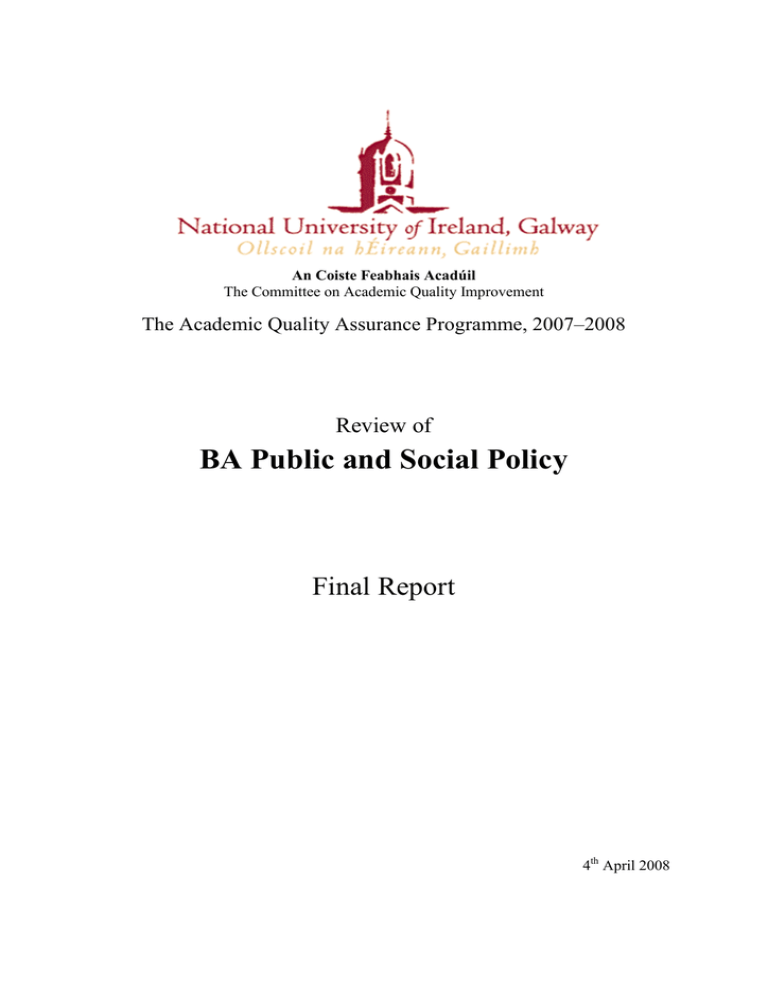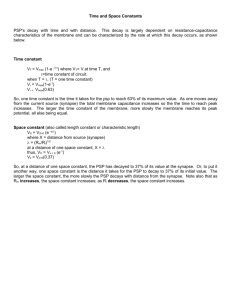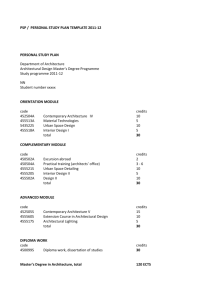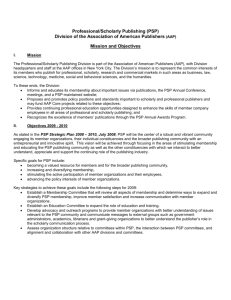BA Public and Social Policy Final Report Review of
advertisement

An Coiste Feabhais Acadúil The Committee on Academic Quality Improvement The Academic Quality Assurance Programme, 2007–2008 Review of BA Public and Social Policy Final Report 4th April 2008 2 This report arises from a visit by the Review Group to the BA Public and Social Policy programme on 1st February, 2008. The programme had already prepared and submitted a 'Self Assessment Report' that, with other documentation, was made available to the Review Group in advance of the visit. Additional information was provided on the day of the visit. The Review Group consisted of: Professor Tim Blackman, Director, Wolfson Research Institute, Durham University (Chair); Dr Brid Quinn, Department of Politics and Public Administration, University of Limerick; Dr Rachel Cave, Department of Earth and Ocean Sciences, NUI Galway; and Dr Andrew Flaus, Department of Biochemistry, NUI Galway acting as rapporteur. The report is structured under the following topics: 1. Introduction 2. Aims and Objectives 3. Organisation and Management 4. Programmes and Instruction 5. Scholarship and Research 6. The Wider Context 7. Summary and Concluding Remarks 8. Comments on the Methodology of the Review Process 1. Introduction The BA in Public and Social Policy is a three-year multi-disciplinary degree operated as an equal cooperation between the Departments of Political Science and Sociology and Economics in the Faculty of Arts, and the Department of Law in the Faculty of Law. The programme has been offered for some 10 years and currently has some 140 enrolled students. As detailed in section A2.1 of the Self Assessment Report, Dr Michelle Millar of the Department of Political Science and Sociology currently acts as Programme Coordinator and this department sponsors the programme. Ms. Lucy Ann Buckley of the Department of Law and Dr. Mary Silles of the Department of Economics act as departmental coordinators for their respective departments. 2. Aims and Objectives 2.1 Stated Aims The BA in Public and Social Policy (BA PSP) has the aim of providing students with a detailed understanding of the basis and implications of policy through a multidisciplinary programme of education. This entails groundings in political science and sociology, economics and law. 2.2 Positioning and Perception The BA PSP provides a novel undergraduate route into the area of public policy that the Review Group understands to be distinct from related courses in other Irish universities, and from diploma courses offered by the Institute of Public Administration. As explained to the Review Group, the original intention was that the BA PSP would be a flagship course attracting high calibre students and providing them with a substantive programme of education from all three contributing departments. 3 In practice there is a widespread perception that the BA PSP now acts substantially as an entry into 1st year Arts for those with insufficient Leaving Certificate points for the Arts omnibus programme. Of the 495 preferences for the programme in 2007, 40 were first preferences, although this was a 60% increase on 2006. The programme also acts as an entry point for several mature students each year. The most common single destination of those graduating from the BA PSP programme is further study. This was the case for case for 60% of graduates in 2006, half of whom were admitted to the LLB at NUI Galway. Few graduates appear to proceed into careers related obviously to the public and social policy arena. The Head of the Careers Office commented in a communication to the review group that election or success in first job entry was ‘very poor’. The mismatch between declared aim and actual positioning of the BA PSP was mirrored in the lack of shared aims, common vision and clearly articulated rationale for the programme among those who teach and take responsibility for it. However, the Review Group also noted evidence of some impressive individual commitment to the programme. The students that the Review Group met nevertheless made sense of the programme and had a steadfastly positive view of it: “If it was better marketed, I’d have put it down first [on my CAO form]. I’d have said ‘That’s what I want to do’” (1st year student) “Economics, Law and Politics, and how everything comes together” (3rd year student) “You have an opportunity to go in so many different directions” (past graduate) Consistent with this, a focus group study commissioned by the Quality Office in which approximately half of BA PSP students participated found that 60% declared themselves satisfied and only 5% dissatisfied with the programme despite advancing a raft of criticisms of its organization, content and management. The BA PSP programme appears to be valued by a sizeable cohort of its students. 2.3 Programme Objectives The divergence in staff perspectives on the programme is almost certainly linked to a lack of clear objectives. This is the result of the absence of the normal structures expected for a multi-disciplinary programme including a Programme Director, Teaching Committee, curriculum inventory and explicit learning outcomes. Additionally, a lack of uniqueness in the modules making up the programme is evident: Some 80% of modules (as listed in the Self Assessment Report) appear to be shared with other programmes, including the entirety of the 2nd year course. The lack of common vision, explicit objectives and unique content militate against a clear identity for the programme. Almost without exception, the staff that the Review Group met identified themselves with their home departments instead of as leaders or contributors in a degree ‘team’. Some staff complained that a high proportion of students were poorly motivated as judged by attendance and assessment levels but this is no doubt exacerbated, if not caused, by the lack of an academic community engaged in the programme, its concept and its rationale. As remarked to the Review Group by a student: “If you choose a course, you’d sort of expect the teaching to have something to do with it.” 4 This absence of a motivating identity on top of the relatively low entry level was seen by the Review Group as likely to be responsible for the obvious negative spiral of poor student attainment and limited staff engagement. 3. Organisation and Management The BA PSP does not appear to have a Programme Board with a meeting schedule, or a formal agreement about roles and responsibilities for organisation of the degree. There is no obvious history of a Programme Director function to provide leadership and manage decision making for those contributing to the programme. An informal understanding exists for the three contributing heads of department to act as ‘sponsor’ in a coordinating role on a three year basis, although the long term chronology is unclear from the Self Assessment Report. There is a clear problem of coordination between the three departments that the Review Group felt was exacerbated by the rotating responsibility for the programme. The Departmental coordinator from the Department of Political Science and Sociology currently acts as a Programme Coordinator within the frame of the rotating departmental sponsorship. She takes most of the responsibility for organisation of the programme. The tasks of Programme Coordinator appear to be largely administrative, but the role and responsibilities of this position are not explicitly specified. Each of the three contributing departments independently assigns an internal departmental coordinator for the programme. Each department uses its own organisational structures and practices for those programme components which it provides. There have been significant changes in the modules offered over the years, and changes of emphasis or content within modules. However, it was not clear to the Review Group that any of these changes have been assessed by a formally constituted Programme Board or Curriculum Committee, or checked for compliance with formal university procedures and regulations. This may leave the programme open to challenge by students on procedural grounds. In addition, the programme does not appear to receive any scrutiny from an External Examiner beyond students’ work being randomly included in samples sent to disciplinespecific Externals. None of those Examiners appears to have specific expertise in public or social policy. 3.1 Student Perspectives The Review Group met both past graduates and students from all three years of the programme. They displayed great enthusiasm for the programme’s multi-disciplinary approach, felt intellectually stimulated by it, and recognised the potential contribution of its graduates to the betterment of Irish society. Students seem to have a good relationship with the present Programme Coordinator. Although she took over this role in the current academic year, she has previous experience in it and students find her a fund of information and very helpful with all their queries. An introductory lecture is held at the start of 1st year. However, there is no course handbook available outlining all the modules and describing what they can expect in future years, so students are largely unaware of what lies ahead. 5 Because modules are run independently by each contributing department, even the most basic details for individual modules such as timetables have to be acquired independently by the students from the respective departments. Furthermore, individual outlines are only given out at the start of each module. It is not clear to students where to find information if they do not receive it when first handed out. Useful tutorials and other relevant information about non-compulsory teaching sessions are available for students taking modules in the various departments, but BA PSP students appear often not to be given this information and find it out by accident, if at all. 3.2 Staff Perspectives Both heads of department and academic teaching staff appear to feel the programme has merit, and clearly care about the students on it. However, none of the heads of department appear to feel ownership of this programme despite their periodic sponsor roles. All staff met by the Review Group felt that a Quality Review of this programme was overdue. The heads of department and departmental coordinators seem to have generally good relationships with each other and there is no obvious reason why they could not come together more effectively within a Programme Board. Minutes of two meetings in 2002 entitled ‘Faculty Board’ and ‘Course Board’ concerning the BA PSP management were provided to the Review Group. These feature many of the issues identified in this review but no obvious action appears to have resulted from those meetings. The Quality Review of the Department of Political Science and Sociology in 2005, whilst accepting that the problems did not emanate from that department alone, also recommended problems in the BA PSP should be addressed. There does not appear to have been any concerted action to address the issues which were apprised in these different fora. Some staff feel there is inadequate administrative support at the departmental coordination level. However, the Review Group saw no special need for additional measures outside the normal level of administrative support to be expected from within participating departments for any programme in the University that they are involved with or responsible for. The current Programme Coordinator has had her teaching workload reduced accordingly within the Department of Political Science and Sociology, and her head of department has authorised support as necessary by departmental administrative staff. 3.3 Communication between Students and Staff It appears that no programme handbook has ever been produced at any level in the BA PSP since its inception. Handbooks of this type have been created by coordinators of similar programmes throughout the University and are clearly an investment worth making. Once produced the effort of updating a handbook annually is minimal in time and cost but repaid many-fold by the reduction in time spent answering student queries. Such a handbook needs to contain information on modules such as contact hours, practical components, and assessment and marking schemes. It needs to spell out the options available in each year, the availability of tutorials and other learning supports. The contact details of all relevant staff members and their responsibilities must be included. It should contain an overview of the course from 1st -3rd year, and should explain to students where to go if they experience problems. 6 There appears to be no designated notice board where students can find information relevant to them. Web pages for the course reportedly came online this year although the link was not supplied to the Review Group. Use has been made of Blackboard in some modules and this assists communication. It was claimed by some staff that significant time is spent in chasing students who have failed to hand in pieces of work. Normal practice is to make it the responsibility of the student to comply with deadlines, although in the absence of effective channels of communication students may not know of deadlines or the consequences of missing them. 3.4 Recommendations 1. The Head of the Department of Political Science and Sociology should take permanent leadership of the BA PSP. This is an Arts degree programme with ultimate responsibility held by the Dean of Arts, Social Sciences and Celtic Studies. 2. The heads of the three contributing departments should each nominate a Departmental Coordinator from within their department. Except in extreme circumstances, changes in nomination should only occur immediately after the summer exams to facilitate preparation for the start of the next academic year. 3. The Head of Political Science and Sociology, in a position of permanent leadership of the BA PSP, should appoint one of the departmental coordinators as Programme Director, responsible for a smooth and consistent experience for all students and staff involved with the programme on a day-to-day basis. There is no a priori need for this assignment to be rotated. The role definition of this position should also specify the limits of involvement where they interface with responsibilities specific to departmental coordinators and module teachers. 4. The Programme Director should take on specific responsibility for 1st year students because this is the crucial year for many students. The other two departmental coordinators should take on visible and effective overall coordination roles for 2nd and 3rd year respectively. 5. The Head of Political Science and Sociology should chair a Programme Board to take direct responsibility for the success of the BA PSP. The Programme Board should include the heads of the contributing departments, the departmental coordinators, and other contributors where pertinent. It should oversee curriculum and statutory requirements, monitor standards, ensure teaching quality, and oversee coordination of the programme. The Programme Director should ensure that the Programme Board meets at least twice a year, with minutes reported to the Dean of Arts, Social Sciences and Celtic Studies. 6. The Programme Director should convene a Teaching Committee of relevant staff across all disciplines that contribute to the programme. The Programme Director should ensure that the Teaching Committee meets at the start of each semester and also specifically to review exam results of all BA PSP students in advance of the Faculty exam board meetings. The minutes of these meetings should be reported to the Programme Board. 7. A single comprehensive handbook covering all three years of the programme should be created before the end of the current academic year (07/08) and provided to all students in orientation sessions at the start of the next academic year (08/09). This handbook should be created together by the three year group coordinators under the 7 leadership of the Programme Director, with input from the class reps. 8. A dedicated notice board for programme-specific information should be set up in an appropriate location accessible to students, and maintained by the departmental coordinators. All timetables and other relevant programme-wide information should be displayed there. Blackboard should be used for module-specific information. 9. The content and design of the BA PSP presentation in the Faculty of Arts brochure could be readily adapted to a small programme-specific brochure, with the small costs involved being shared between the two Faculties benefiting from the degree. 10. The appointment of an External Examiner would provide useful overview of the programme’s content, efficacy and student achievement. University management told the Review Group that they were unaware of any formal request for an external examiner but saw no reason why funds would not be available for this. 4. Programmes and Instruction The BA Public and Social Policy is an ambitious multi-disciplinary programme which aims to provide students with a detailed understanding of various dimensions of policy-making through the study of economics, law, and sociology and politics. However, in its current form, the programme lacks the curricular and pedagogical coherence to achieve its laudable aims. This is reflected in the current poor student achievement and high failure rate, a fact illustrated in the recent semester 1 examinations for first year students where 60% failed at least one and 40% failed two or more of the four modules examined. Over the three years of the programme, students are exposed to a range of module formats and approaches to delivery. While such eclecticism benefits learners, a number of issues arise. Some faculty have selected specific learning outcomes and use both formative and summative assessment techniques but a significant number of modules do not identify learning outcomes and many are assessed purely on a final examination. Some faculty included marking standards for particular modules but there is little evidence of consistency across the programme and few modules specify mechanisms for student feedback. Although many of the elements for a coherent programme exist, the overall curriculum presents itself as a medley of available modules from contributing departments rather than a carefully constructed programme focussed on building student understanding of public and social policy. For example, the 2nd year curriculum is strongly weighted towards economics with little emphasis on the policy dimension. Students currently seem to be left alone to make sense of the programme, an issue compounded by the fact that so many modules are taken with large groups of students from other programmes. It is only in 3rd year that the policy seminar endeavours to link the different strands. The rotating responsibility for the programme with the consequent lack of clear programme management makes it difficult to achieve continuity and consistency with regard to student focus, educational outcomes and pedagogical priorities. The lack of programme material with clearly stated programme objectives adds to these difficulties. It was apparent talking with the students that many starting out on this programme have little idea that there is a large economics component, requiring significant mathematical ability. This appears to be the single biggest academic problem encountered by students and a major source of difficulties since those who enrol for the BA PSP cannot readily transfer to another programme. 8 Nevertheless, the Review Group were impressed by the dedication and commitment of many of the faculty contributing to the programme and their efforts to ensure a positive learning experience for students. 4.1 Recommendations 1. The Programme Board and Teaching Committee must act decisively to achieve programme coherence, greater balance between the subject streams, continuity within the curriculum, and connectivity between modules. 2. Immediate priority must be given to monitoring the failure rate among first years and the ongoing increase in repeat students in second year. Attention should also be given the low proportion of 2.1 and first class awards in 3rd year. These are causes for serious concern. 3. Monitoring of the career paths of graduates is also recommended, as there seems to be a disconnection between the programme’s stated aims and employment patterns. 4. The Programme Board should also consider radical restructuring of the programme to facilitate a stronger policy focus. Consideration should also be given to reorganising the programme content in a manner that retains core elements but allows for discipline-oriented routes through the BA PSP. This is the model in place for comparable programmes at the University of Michigan, the University of Limerick and University College Cork. 5. In reviewing the programme content, the Programme Board should consider including: a. More training in applied research and evaluation. b. Greater focus on preparation for evidence-based decision-making. c. The opportunity to engage in self-directed learning/research in the form of a final year project/dissertation. d. The inclusion of an experiential learning component to enhance the policyoriented programme. e. Articulation and development of the generic skills. f. The appropriate level of microeconomics for this programme. g. The provision of extra tutorials. The Review Group noted worthy attempts to address subject specific difficulties in Economics, and such measures may also be necessary for other modules. 6. The Teaching Committee should bring all programme contributors together to: a. Agree learning outcomes, assessment and feedback strategies. The expertise of CELT could be drawn upon in this respect. b. Encourage regular revision and updating of the contents of all modules to reflect policy developments and new publications. c. Address the attendance problems referred to by some of those interviewed. This needs to be tackled at both programme and module levels and a culture of responsibility for their learning fostered among students. 9 5. Scholarship and Research There was no information in the Self Assessment Report about how the programme links with research, and the absence of staff CVs meant that the Review Group could not assess from the documentation how individual staff research informs teaching and learning. Although the programme was set up to produce graduates with high-level policy skills, it was not embedded in a policy research centre or institute. This might have enhanced the status of the programme, would have created a framework for research-led teaching, and would have linked the programme to a group of research students engaged in policy research. In addition, the programme has little research methods content, which might be regarded as an issue at a time when policy-making is expected to be evidence-informed if not evidence-based. There is potential for this situation to change. The Review Group was made aware that the University wants to strengthen its profile in Irish public policy. The programme, if linked to a research framework, could help to achieve this focus. Across the University there are research groups undertaking policy research, such as in the Social Sciences Research Centre, the Irish Centre for Human Rights and the Irish Centre for Social Gerontology. There is also a Graduate School of Business and Public Policy. A number of staff met by the Review Group were able to demonstrate links between aspects of their research and their teaching. While the issue of strengthening the University’s policy research reputation is beyond the scope of this review, the fact that it appears to be a current issue means that any strategic initiative in this field could be important to the BA PSP and cultivation of a supportive academic community. 5.1 Recommendations 1. Stronger links should be developed between this programme and research being carried out by contributing faculty. The opportunity for linkages with local research centres and institutes should be actively explored and exploited, including potential contributions to the University’s ambition for expansion of postgraduate programmes. Leadership for this should be taken by the Programme Board. 6. The Wider Context In a context of growing social and economic complexity, there is little doubt that graduatelevel skills are needed in many organisations that make, evaluate or implement public and social policies in Ireland and other countries. However, beyond professional vocational courses it is by no means evident that employers are seeking specific policy knowledge or whether what is needed are good generic graduate skills. The BA PSP programme tends to span both, with the elements of a policy curriculum having been combined with disciplinary knowledge in economics, politics, sociology and law. The Review Group did not find, though, that this approach reflected market research with employers about the kind of programme from which they would want to recruit graduates. In fact, the employment destination survey data that the Review Group saw indicated that the programme’s graduates are not finding work in the policy sector but are instead either progressing to further study (principally the LLB at NUI Galway) or entering quite low skilled employment. Although the students that the Group saw were universally positive about how the programme was preparing them to be informed citizens, there is clearly a need to position it 10 as either a high quality education in policy studies or a high quality multidisciplinary social sciences degree. Realising the BA PSP as a high quality education in policy studies is likely to pose particular challenges without a close working relationship with employers such as the Irish civil service or local government. Although the Review Group had no Irish data available to it, Professor Blackman was able to advise the Group that undergraduate programmes in social and public policy in the UK have found it difficult to attract well-qualified candidates and many single honours programmes in these subjects have been withdrawn. Repositioning the BA PSP as a high quality multidisciplinary social sciences degree might be realistically achieved by assimilating the programme into the BA Connect initiative, given its focus on employability and multidisciplinarity. This could resolve the programme’s organisational problems, raise its profile and admission requirements, and still offer flexibility. Reorganisation as a four year programme would also relieve some of the current problems of module and assessment load on students and create the possibility of incorporating an off-campus placement. 6.1 Recommendations 1. Careful consideration should be given by the Programme Board to how the programme is positioned and branded in its market. Consultation with employers would be useful and a change in the name of the programme may be advisable. 2. The Programme Board, in consultation with the Faculties of Arts and Law, should undertake a formal analysis of options for re-orienting the curriculum. The Review Group considered three possible scenarios in the time available to it: a. Retention of the BA PSP as a tripartite interdisciplinary programme combining substantive components of politics and sociology, economics, and law within the current format. The programme itself would nevertheless be subject to significant improvements in curriculum and organisation. This retains the original vision of the programme but does not directly address the problem of low entry standards to a challenging academic programme. b. Redesign of BA PSP to retain the broad tripartite thematic core, but with specialisation on one or two components beginning in 2nd year and emphasised in the 3rd year. This maintains disciplinary depth in the specialisations and assures overall academic standards, whilst respecting the realistic ability and career prospects of the students entering the programme. c. Assimilation into the 4 year BA Connect initiative, with necessary adaptation of components. This simplifies the Arts Faculty offerings and provides the necessary organisational framework for the programme. The experience of those involved with BA PSP may benefit BA Connect. This option requires extensive adaptation of the curriculum and may reduce access to the course for mature students and those with poorer Leaving Certificate scores. 11 7. Summary and Concluding Remarks The BA PSP was launched with the aim of providing trained graduates in public and social policy for a rapidly evolving Ireland. This continues to fit well with current strategic priorities 1 and 4 of NUI Galway to provide attractive courses for high quality students, and to maximize contribution at national and regional levels. A clear opportunity exists for the BA in Public and Social Policy. Despite continuing difficulties with achievement, coherence, and organisational structures, the original vision of the programme’s founders remains both alive and appealing for many students. The fundamental challenge to be faced by those responsible is whether the will exists to implement its multi-disciplinary nature effectively, perhaps in a radically revised format. It is crucial that the lack of a formal and effective coordination structure across contributing disciplines is redressed. It will then be possible to implement standard practices for which there is ample expertise from other multi-disciplinary programmes within the university. Within a solid organisational foundation, a coherent programme of study can finally be assembled to target the aims and objectives of the degree. These must nevertheless be based on a realistic assessment of the needs of both students and employers. The need for immediate and fundamental reform of the BA in Public and Social Policy is without question. The programme cannot continue to trade on laudable intent, goodwill of students, and the enthusiasm of a handful of motivated staff. 8. Comments on Methodology of the Review Process The Review Group is grateful for the engagement of the many staff and students it met during its visit. It particularly appreciated the active participation and frankness of contributions from students and individual teaching staff about their experience of the programme, and from management about their personal perspectives on the position of the programme. Unfortunately, the Review Group is obliged to comment on the quality of the Self Assessment Report (SAR). A stated purpose of the SAR is “to be a source of basic information for the Review Group.” In this regard the SAR provided was inadequate and many crucial components as set out in section 4.5 of the Guidelines for Academic Quality Reviews were missing. The Review Group accepts that the Quality Office cannot directly manage the detailed content of the SAR, and indeed that the process of compilation is a reflection of the unit under review. However, we suggest that the Quality Office police the inclusion of a formal checklist within every SAR that itemises core items of obligatory content. The Guidelines for Academic Quality Reviews also state that the SAR should “represent the Unit’s own views of its organisation and management”. It remains unclear to the Review Group who contributed to, oversaw, and agreed to the SAR it was presented with. This was a serious weakness because issues of organisation and collectivity are central to the multidisciplinary unit under review. We suggest that to ensure appropriate engagement and awareness of every future SARs, the signature of each member in the organisational hierarchy up to faculty level should be required on the cover page (ie all coordinators, heads of departments and deans involved). 12 The Review Group regrets being unable to discuss the BA PSP with a senior representative of the Department of Law during the visit because of that Department’s concurrent involvement in an appointment process. The review group believes that the review process has provided a valuable opportunity for reflection on the structure, content and delivery of the BA PSP and advocates that modifications should be agreed and implemented as soon as possible. Professor Tim Blackman (Chair) Dr Brid Quinn Dr Rachel Cave Dr Andrew Flaus (Rapporteur) 4th April 2008.





